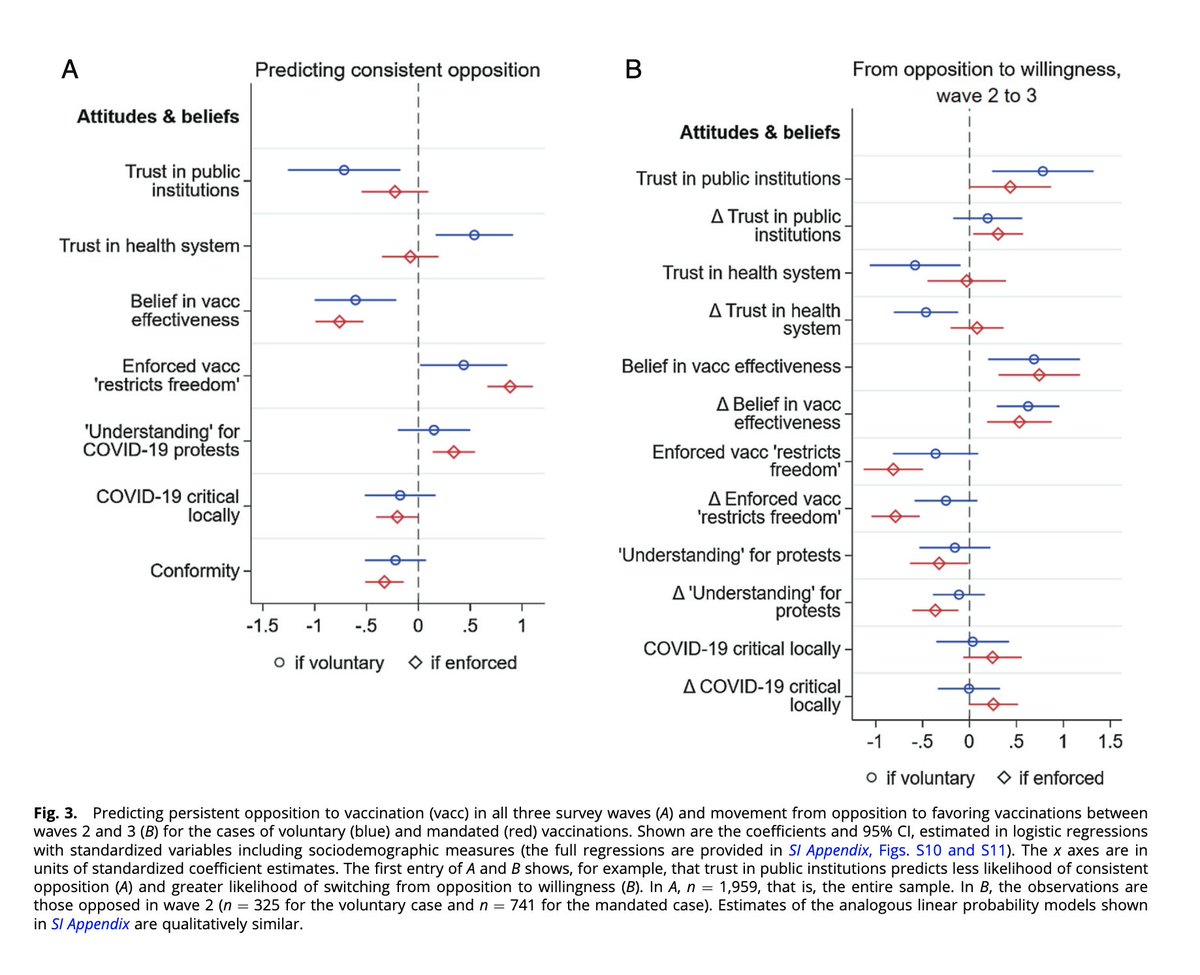
🌍 Our 2022 #Science Board Symposium on "The #Emergent #PoliticalEconomy or #ClimateChange" kicks off with opening remarks from President David Krakauer.
Follow this 🧵 as we provide live coverage of this event all day...

Follow this 🧵 as we provide live coverage of this event all day...

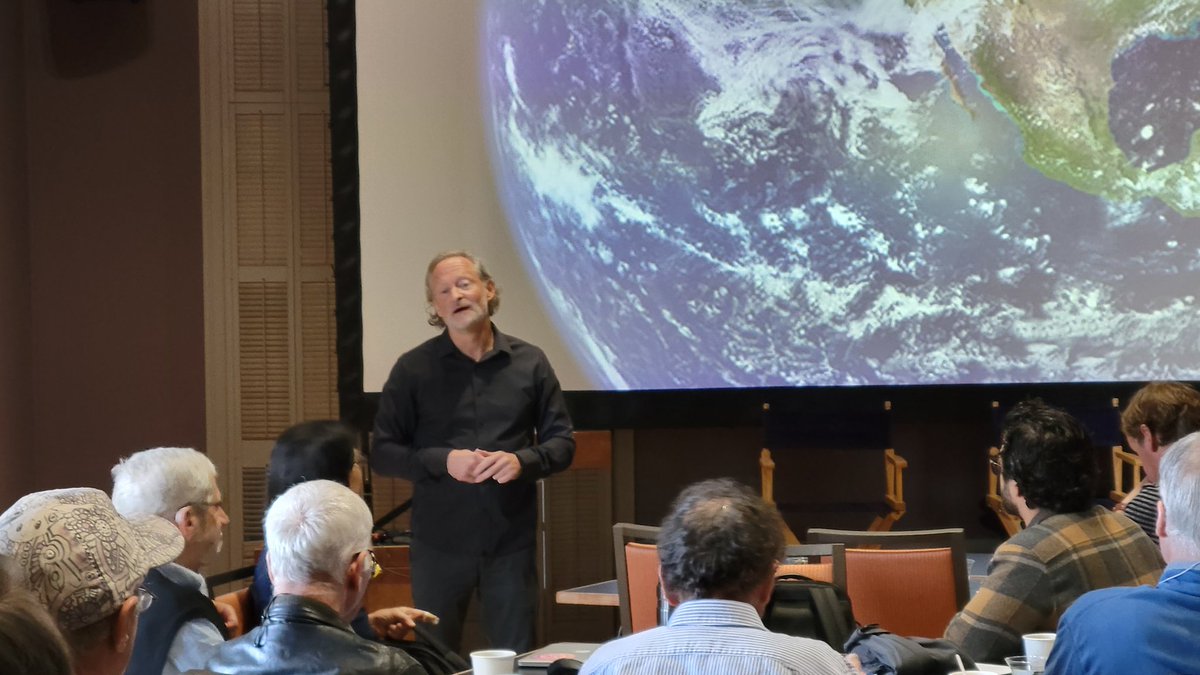
"For those of you who think behavior change can prevent #ClimateChange...behavior WILL change when climate changes. Shutdowns from the pandemic resulted in a reduction of #C02 emissions of about 7.5%."
- SFI/@Harvard Prof Dan Schrag opens our speaker series today
- SFI/@Harvard Prof Dan Schrag opens our speaker series today

"We *used* to talk about #ClimateChange used to be something that would happen to people in Bangladesh fifty years from now."
Re: #ClimateJustice,
"Children born today are going to deal with climate change they had no role in causing."
- SFI/@Harvard Prof Dan Schrag


Re: #ClimateJustice,
"Children born today are going to deal with climate change they had no role in causing."
- SFI/@Harvard Prof Dan Schrag

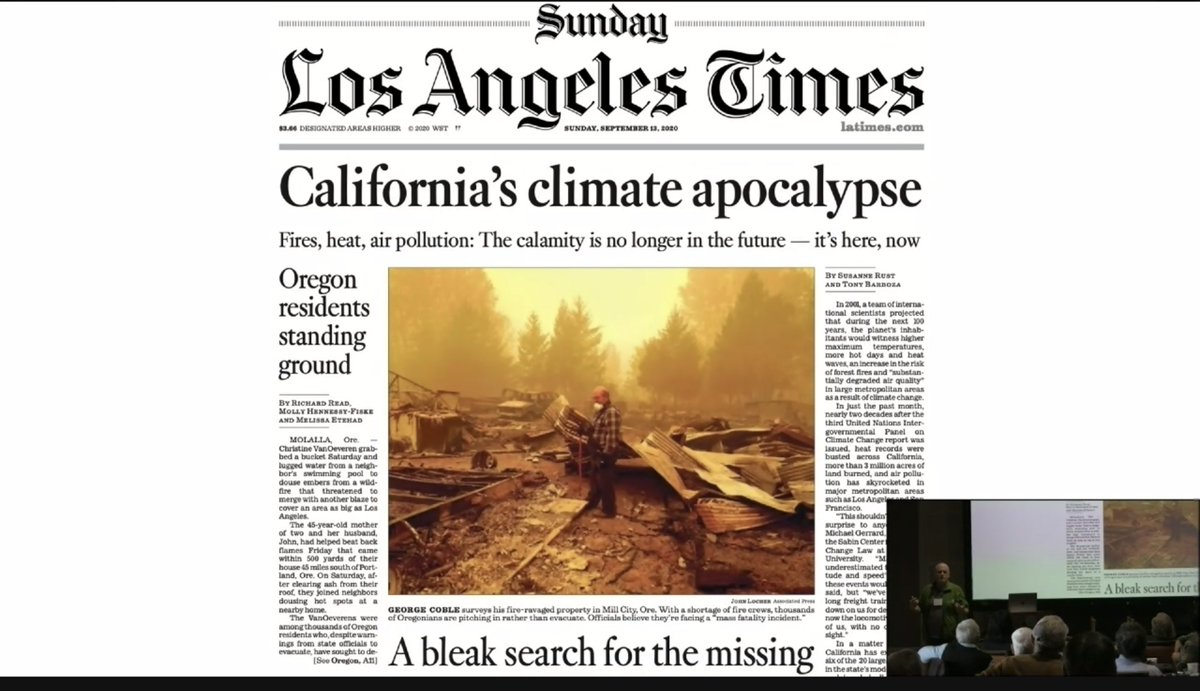

"The timescales of #ClimateChange are REALLY long. Centuries to millennia. We've set something in motion, a complex system, that is not going to stop. So the question is, how will the political economies of our world evolve to adapt?"
- SFI/@Harvard Prof Dan Schrag
- SFI/@Harvard Prof Dan Schrag

"We've spent close to 40 years working on the problem of #ClimateChange and achieved almost nothing. What does that tell us about our theories of policy and political change? The backdrop to this is the EXTRAORDINARY success of the #OzoneLayer."
- David G. Victor, SFI/@UCSanDiego

- David G. Victor, SFI/@UCSanDiego


"We wrote the treaties [to save the #OzoneLayer] for exemptions. THAT explains the success, & unfortunately we have failed to replicate that with #ClimateChange [legislation]. But we've gotten very good at making charts that LOOK like we have."
- David G. Victor, SFI/@UCSanDiego

- David G. Victor, SFI/@UCSanDiego


"#Technology is key here. I'm a political scientist, and I study technology. Because if we think that this is going to be fixed by asking people to stop driving around and eating meat...this is not going to happen."
- David G. Victor, SFI/@UCSanDiego
#Risk #Uncertainty #Climate
- David G. Victor, SFI/@UCSanDiego
#Risk #Uncertainty #Climate

"We have a theory of change that is wrong, based on mimicking the Montreal Protocol for the #OzoneLayer...trying to alter the behavior of firms and state-owned enterprises. This is a lawyer's theory of change that stands absolutely no chance."
- David G. Victor, SFI/@UCSanDiego
- David G. Victor, SFI/@UCSanDiego
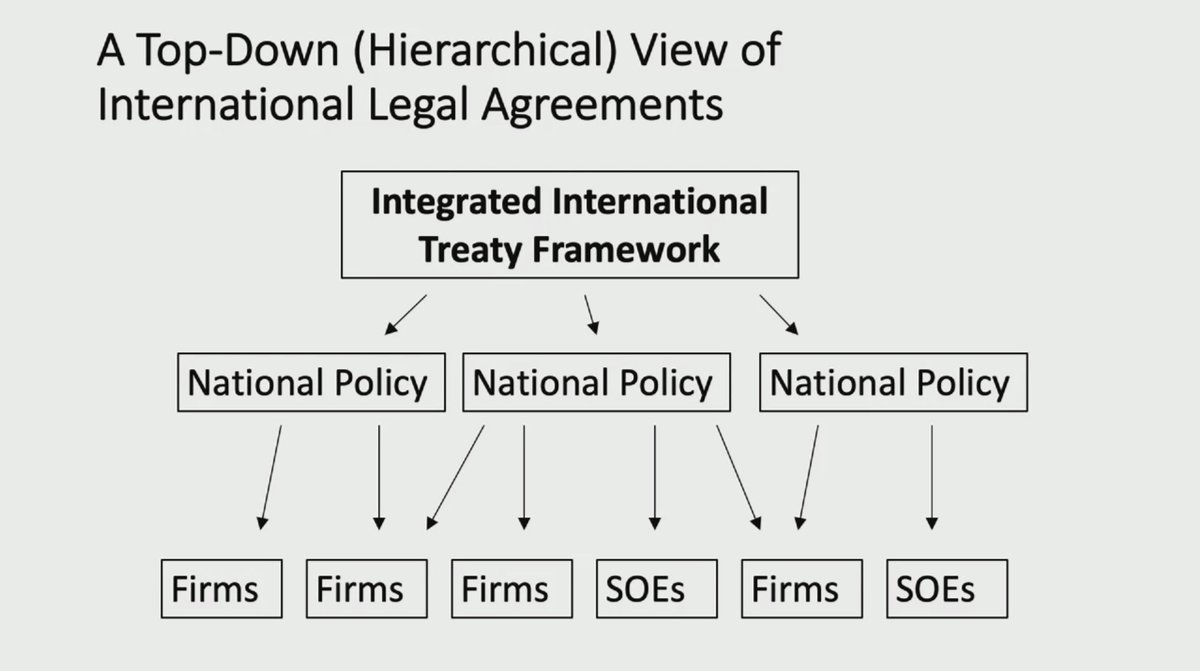
"There is no compliance crisis in international environmental law. There's an IMPACT crisis."
"Countries were selecting whether to go into the #KyotoProtocol or not based on whether they were *already on track* to reduce emissions."
- David G. Victor, SFI/@UCSanDiego #Climate
"Countries were selecting whether to go into the #KyotoProtocol or not based on whether they were *already on track* to reduce emissions."
- David G. Victor, SFI/@UCSanDiego #Climate

"If we're going to have a proper theory of politics about thinking about technological change, we have to break it down and think about key sectors. What I want to think about is change not in terms of a global industry but individual sectors."
- David G. Victor, SFI/@UCSanDiego


- David G. Victor, SFI/@UCSanDiego



"What can we do, sector by sector, to change the rules on the ground?"
"It was not clear at the beginning of [The Automotive Age] which version {electric, combustion, or steam] was going to win out. We're at that point now with #ClimateChange."
- David G. Victor, SFI/@UCSanDiego
"It was not clear at the beginning of [The Automotive Age] which version {electric, combustion, or steam] was going to win out. We're at that point now with #ClimateChange."
- David G. Victor, SFI/@UCSanDiego

"The sector that's furthest along is the #power sector. And that's good, because the power sector is likely to play *the single greatest* role in the process of #decarbonization. ... You can't just build a big #battery network."
- David G. Victor, SFI/@UCSanDiego
- David G. Victor, SFI/@UCSanDiego
"The theory I'm talking about is a theory of niche markets. This is the same theory of politics that trade economists have been using & it's the way we need to start thinking about #ClimateChange to make it possible for countries to cooperate."
- David G. Victor, SFI/@UCSanDiego
- David G. Victor, SFI/@UCSanDiego

@UCSanDiego "It's a theory of change that involves decentralizing and incentivizing industries to go off and find solutions."
- David G. Victor, SFI/@UCSanDiego
#ClimateChange #BigBusiness #Policy


- David G. Victor, SFI/@UCSanDiego
#ClimateChange #BigBusiness #Policy



"The classic notion of externality is that firms are best placed to identify the best technological choices. But what motivates search is the fear of the firms that if they don't get serious about the problem, they will cease to exist."
- David G. Victor, SFI/@UCSanDiego

- David G. Victor, SFI/@UCSanDiego


@UCSanDiego "We need to hunt for #variation. It doesn't really require us to think about this as a global #cooperation problem."
"#C02 is horrible, but it doesn't do harm to us directly. As a political scientist, soot is an AMAZING #pollutant, b/c people care about dying."
- David G. Victor

"#C02 is horrible, but it doesn't do harm to us directly. As a political scientist, soot is an AMAZING #pollutant, b/c people care about dying."
- David G. Victor


@UCSanDiego "If you choose your club members wisely, if you focus on #soot, you can very quickly get to clubs of two or three countries that reduce soot almost completely."
- David G. Victor, SFI/@UCSanDiego on decentralizing #climate coordination across different #pollutant types
#methane
- David G. Victor, SFI/@UCSanDiego on decentralizing #climate coordination across different #pollutant types
#methane

"The ratio of talking to doing [with #ClimateAction] is...actually very high. But the signal-to-noise ratio among firms is actually going down. Firms that need help managing risks are going to turn to other firms."
- David G. Victor, SFI/@UCSanDiego on anti-competitive pressures
- David G. Victor, SFI/@UCSanDiego on anti-competitive pressures

"You won't need a policy to get people to drive EVs because in 15 years, they'll be cheaper. But it'll always be cheaper to not capture carbon than it will be to capture it."
- Dan Schrag kicks off our first panel w/ Sam Bowles, Jessica Trancik, Simon Levin, David Victor
- Dan Schrag kicks off our first panel w/ Sam Bowles, Jessica Trancik, Simon Levin, David Victor
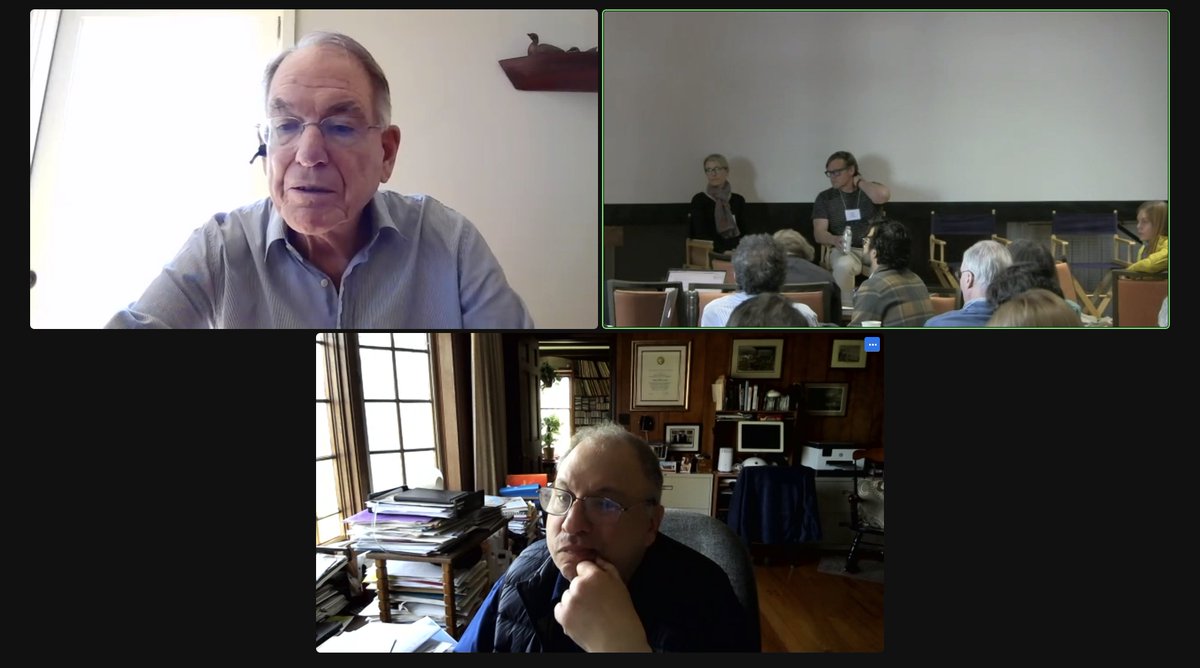
"Ultimately, we're *people* working on these technologies. We're limited by the laws of nature. But all technological improvement is incremental. It may SEEM disruptive to us..."
"We have to be deliberate to increase the success of our investments."
- Jessica Trancik (@MIT, SFI)
"We have to be deliberate to increase the success of our investments."
- Jessica Trancik (@MIT, SFI)

"As a scientist, I see partnerships with corporations to be much more effective with governments at this point."
- Simon Levin (@Princeton, SFI)
- Simon Levin (@Princeton, SFI)

"We have a serious #inequality problem here in dealing with #ClimateChange that is both temporal and spatial. The idea of discounting as a matter of impatience seems to be so TERRIBLY wrong...it's a moral question. Are we willing to discount *other people*?"
- Sam Bowles (SFI)
- Sam Bowles (SFI)

"Green #incentives are no substitute for #green #citizens. Obviously incentives are important, but I'm concerned about how do you sustain a green *citizenry*? We have to stop thinking about optimization on a smooth surface. We're going to get there by...jumps."
- Sam Bowles (SFI)
- Sam Bowles (SFI)

"One way you know that [#Hydrogen #fuel projects] are serious is that you have to sign an NDA to look at them. When they were all vaporware, you didn't."
- David G. Victor (@UCSanDiego, SFI)
- David G. Victor (@UCSanDiego, SFI)

"Countries are forced to align, one way or another. You can't be neutral on this issue. Indeed there are countries like India that are trying to straddle the fence here, but I don't think that's going to work very well. There's forced alignment."
- Simon Levin (@Princeton, SFI)
- Simon Levin (@Princeton, SFI)

"What we're seeing now [with the invasion of #Ukraine] is a shock to the system and we're going to see how Europe and other nations will adapt and transition to another fuel source."
- @MIT+SFI's Jessika Trancik (speaking to the same issue as Simon Levin above)
- @MIT+SFI's Jessika Trancik (speaking to the same issue as Simon Levin above)

"I think we have less to learn [about policy and #ClimateChange] from the Russia/Ukraine situation now and more to learn from the change that took place at the end of the Second World War."
- Sam Bowles, SFI
- Sam Bowles, SFI

"Some of the [#Climate] pollutants are like #Omicron; they don't hurt you very much but they spread a lot. That's the WORST kind of virus because people don't care about it."
- Sam Bowles, SFI
- Sam Bowles, SFI
"The longer term: that's where I'm actually very encouraged. Over the longer team, Europe is moving away from oil and gas altogether. That will have global effects. That's why I'm inclined to think this time will be different..."
- David G. Victor, @UCSanDiego, SFI
- David G. Victor, @UCSanDiego, SFI

"Most of the found ideas [to innovate against #ClimateChange] are probably going to be coming from outside companies and startups [b/c of loyalty to quarterly returns] and brought inside. I think this organizational question is very important."
- David G. Victor, @UCSanDiego, SFI
- David G. Victor, @UCSanDiego, SFI

"Carbon prices are MUCH too low, both based on a cost-benefit analysis and based on what our aspirations are for policy. Different measures of green innovation have been SLOWING DOWN over the past decade, not speeding up."
- Lint Barrage, @ucsantabarbara


- Lint Barrage, @ucsantabarbara


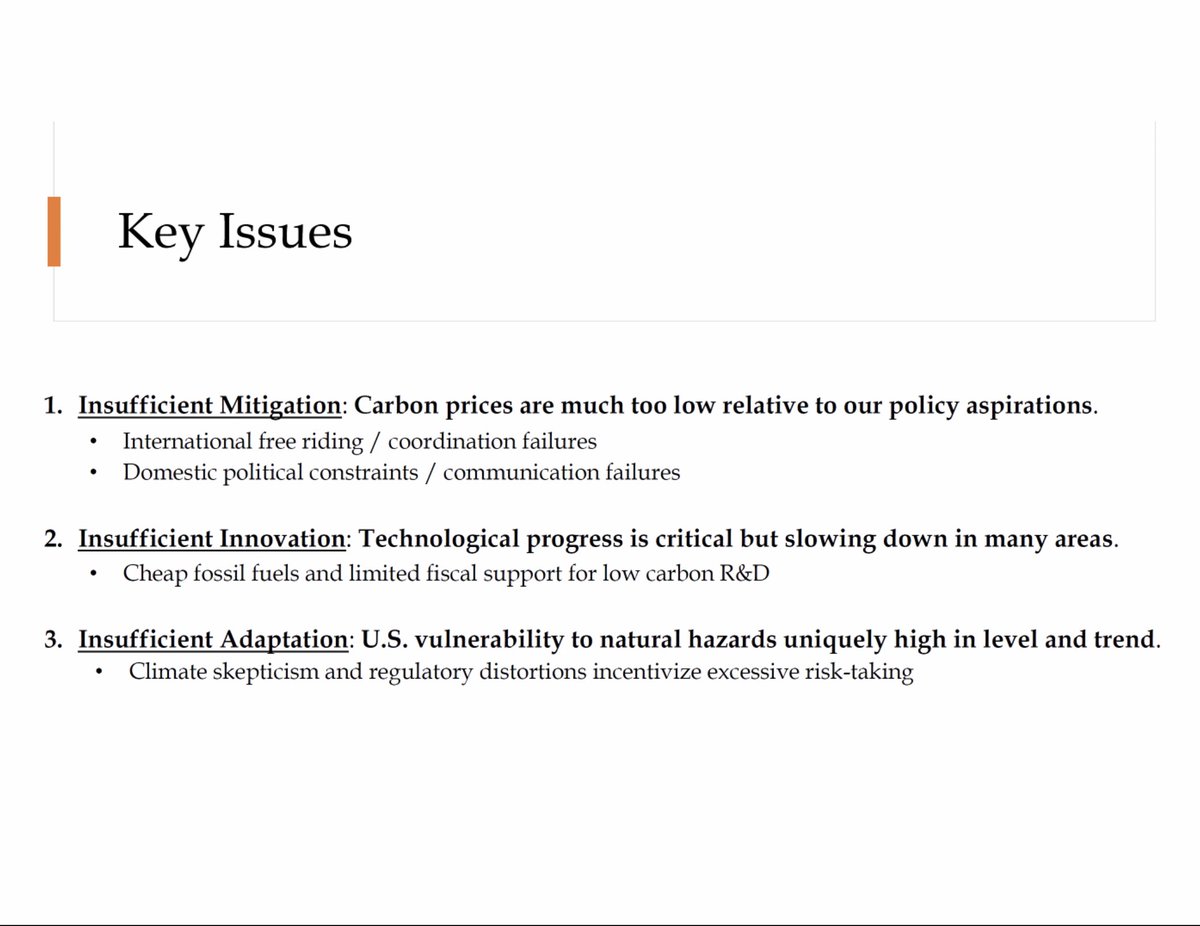
"Economists OVERWHELMINGLY support #carbon pricing as a key policy tool. Almost 99% agree. This is a rather unique level of consensus."
- Lint Barrage, @ucsantabarbara


- Lint Barrage, @ucsantabarbara



"I think there's been a resurgence of skepticism in the last 10 years, including from the left, of these kinds of pricing solutions. But if we can save HALF The Great Recession's worth of economic damage, I'd say that's worth it."
- Lint Barrage, @ucsantabarbara
- Lint Barrage, @ucsantabarbara

1,2. Where we are vs. where economists think we should be with #C02 pricing
3,4. "There's a global tragedy of the commons where every country pays the full cost but only gets a fraction of the benefits."
- Lint Barrage, @ucsantabarbara presenting at our Science Board Symposium



3,4. "There's a global tragedy of the commons where every country pays the full cost but only gets a fraction of the benefits."
- Lint Barrage, @ucsantabarbara presenting at our Science Board Symposium

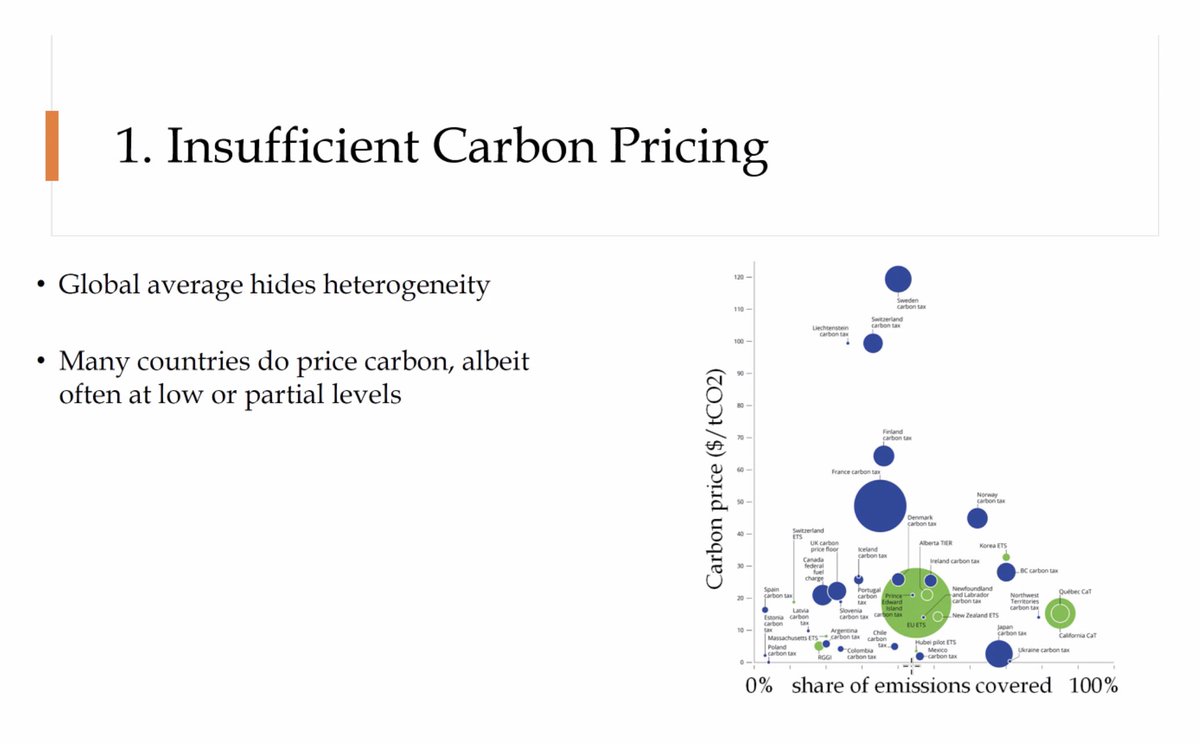


"There're also domestic political constraints that play a role. Depending on the economic context, the domestic benefits of a #carbon price could be quite extensive...#ClimateChange among its other effects, has significant costs."
- Lint Barrage, @ucsantabarbara
#CarbonTax

- Lint Barrage, @ucsantabarbara
#CarbonTax


"Without reliable energy, the level of innovation required to meet economic growth targets isn't possible. And we will need #unprecedented innovation to meet climate goals. But what we've seen in green innovation is a DECLINE. Not just in the US."
- Lint Barrage, @ucsantabarbara



- Lint Barrage, @ucsantabarbara



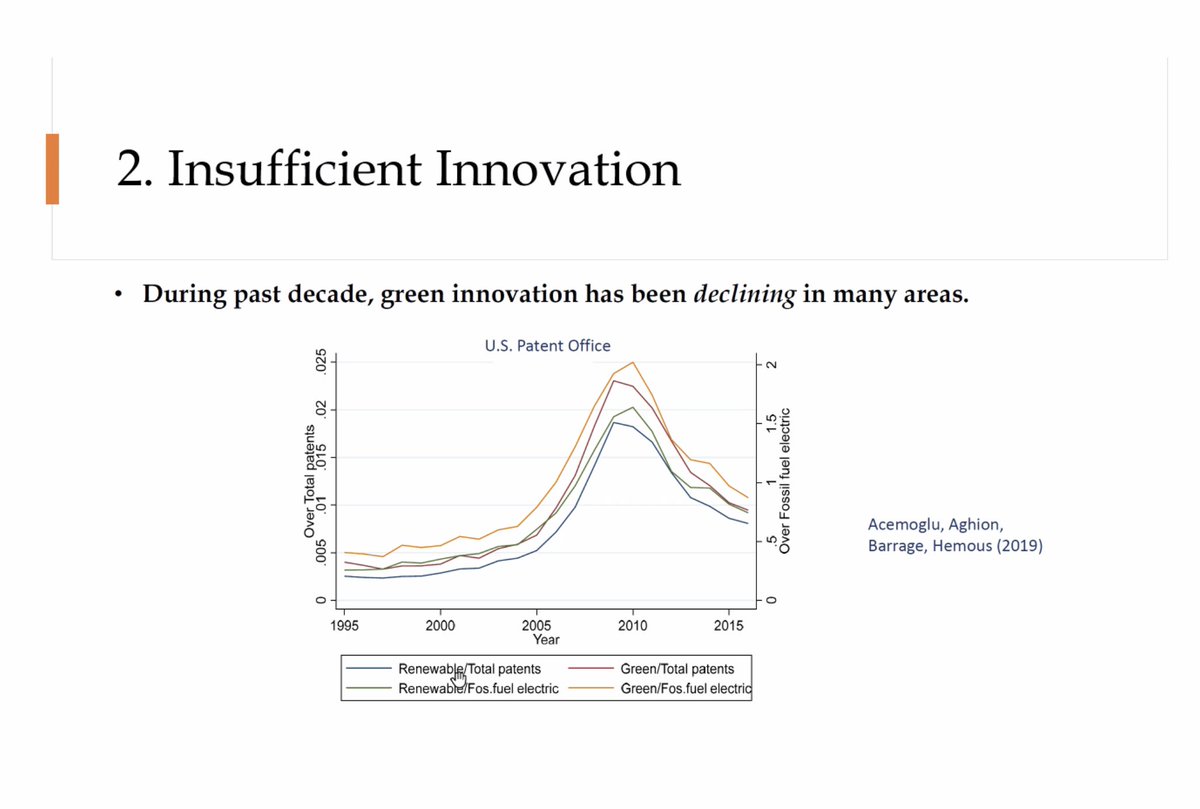
"Historically, cheaper #FossilFuels has been seen as correlated with reduction in #innovation in #GreenEnergy. Other studies have found similar correlations in other areas..."
- Lint Barrage, @ucsantabarbara
- Lint Barrage, @ucsantabarbara

"#Innovation is subject to a double externality, because innovators generally don't get full access to the benefits of their innovations – even with patents."
- Lint Barrage, @ucsantabarbara
- Lint Barrage, @ucsantabarbara

"The US *consistently* ranks as an outlier in its vulnerability to extreme weather events. If the US experiences $2B damages from a storm other countries would experience $166MM from the SAME storm. We're just not seeing risks reflected in prices."
- Lint Barrage, @ucsantabarbara
- Lint Barrage, @ucsantabarbara

"The national average of adults who think #ClimateChange is human-caused is only 64%. And we know that this informs [the estimation of] #risk... A small majority living in @fema flood zones told us they're NOT AT ALL worried."
- Lint Barrage, @ucsantabarbara



- Lint Barrage, @ucsantabarbara




(Note that Lint Barrage is also at @ETH Zürich; apologies for not attributing this affiliatioin in earlier tweets.) #ClimateChange #Economics #CarbonTax 

What happens when deeply held cultural elements come into conflict with what we need to do to keep people safe?
- Dan Schrag (@Harvard, SFI) prompts Raissa D'Souza (@UCDavis), Lint Barrage (@UCSantaBarbara, @ETH), @ricardo_hausman (@HarvardGrwthLab, SFI), & Mirta Galesic (SFI)
- Dan Schrag (@Harvard, SFI) prompts Raissa D'Souza (@UCDavis), Lint Barrage (@UCSantaBarbara, @ETH), @ricardo_hausman (@HarvardGrwthLab, SFI), & Mirta Galesic (SFI)

"The research has found that building codes & #fire building codes are actually very effective for reducing risks. And risk disclosures: nationally, with flood insurance, disclosure requirements are not uniform. It inhibits housing markets from properly adjusting."
- Lint Barrage
- Lint Barrage

"One thing that's really important to understand is the role of #BeliefNetworks. Beliefs about fire #risk are embedded in beliefs about [all kinds of other things]. Once we can tap in and present evidence in a way that doesn't clash, we can change people's minds."
- Mirta Galesic
- Mirta Galesic

"What we know from our research at SFI about #hatespeech is that ORGANIZED #counterspeech helps, not individual... Somehow we need to build organizations to fight scientific #misinformation."
- Mirta Galesic (SFI)
See also: 👉 complexity.simplecast.com/episodes/38
- Mirta Galesic (SFI)
See also: 👉 complexity.simplecast.com/episodes/38
"The first thing that really strikes me is that ideas of #innovation are really led by fear. This tradeoff between #fear & #risk is something we see in #ComplexSystems all the time [w.r.t.] #PowerLaws in the distribution of catastrophic failures."
- Raissa D'Souza (@UCDavis, SFI)
- Raissa D'Souza (@UCDavis, SFI)

"Fish don't know the difference between humans and Americans. There are several dimensions in which the #global perspective matters here. The first one is on the #CarbonTax."
- @ricardo_hausman (@HarvardGrwthLab, SFI)
- @ricardo_hausman (@HarvardGrwthLab, SFI)

"You can get a big coalition of consumers that are all in favor of the #CarbonTax because they don't have to pay for it [if] #oil exporters will have to pay for it."
- @ricardo_hausman (@HarvardGrwthLab+SFI)
Relatedly, new Hausmann piece on taxing Russia:
- @ricardo_hausman (@HarvardGrwthLab+SFI)
Relatedly, new Hausmann piece on taxing Russia:
https://twitter.com/ricardo_hausman/status/1520143366905761792
"We are going to substitute #oil and oil has a fantastic #energy density. That has made the world energetically flat, in the sense that we can have energy-intensive industries located in energy-poor locations."
- @ricardo_hausman (@HarvardGrwthLab+SFI)
- @ricardo_hausman (@HarvardGrwthLab+SFI)

"The world has a revealed preference for #energy prices at a certain level. The reason is very obvious. Now, the cost of a kWh is very similar across the world, by a factor of 4 or so. Differences in income vary by a factor of 100."
- @ricardo_hausman (@HarvardGrwthLab+SFI)
- @ricardo_hausman (@HarvardGrwthLab+SFI)

📝 EDITORIAL CORRECTION
not:
"As a scientist, I see partnerships with corporations to be much more effective with governments at this point."
but:
"As a scientist, I see partnerships with corporations to be much more effective THAN with governments at this point."
- Simon Levin
not:
"As a scientist, I see partnerships with corporations to be much more effective with governments at this point."
but:
"As a scientist, I see partnerships with corporations to be much more effective THAN with governments at this point."
- Simon Levin
@ricardo_hausman @HarvardGrwthLab "The investment in R&D is too low. Where should it come from? The government. And the government is responding to the citizens. So again, we come to this issue of communicating with the public. This is KEY & we're absolutely not doing it right."
- Mirta Galesic (SFI)
#innovation
- Mirta Galesic (SFI)
#innovation

@ricardo_hausman @HarvardGrwthLab "People look at scaling laws then ask us where to place the toilets. I think there is this general problem that complexity science has, which is the high-resolution policy angle. We want to be useful without trying to deform The Institute into a think-tank."
- Pres David Krakauer
- Pres David Krakauer
"We need better models of human behavior in order to better model [other systems, for instance,] how the power grid works. #COVID has made the engineers that we need better human models, and SFI could be the place where we bring this together."
- Raissa D'Souza (@UCDavis+SFI)
- Raissa D'Souza (@UCDavis+SFI)
@ucdavis ...and that's it, folks! Thank you for tuning in. You'll find numerous ways to stay up-to-date on our continuing discussion re: Emergent Political Economies, Climate Change, and much else on our website — including our emails, books, podcasts, and events:
santafe.edu/engage/
santafe.edu/engage/
Editorial correction: Jessika Trancik with two Ks; please accept our apologies; we've been praising her work for years and should have caught this.
https://twitter.com/sfiscience/status/1383180493546459137?t=ZUn3lkYUigPesC8w5s1Hyw&s=19
https://twitter.com/sfiscience/status/1260329002985816064?t=DIGlxrcNM7FshXddf_I3hg&s=19
https://twitter.com/sfiscience/status/1398655472299917312?t=40iucU3Qz2aRYfG8Hc8q3Q&s=19
• • •
Missing some Tweet in this thread? You can try to
force a refresh


















